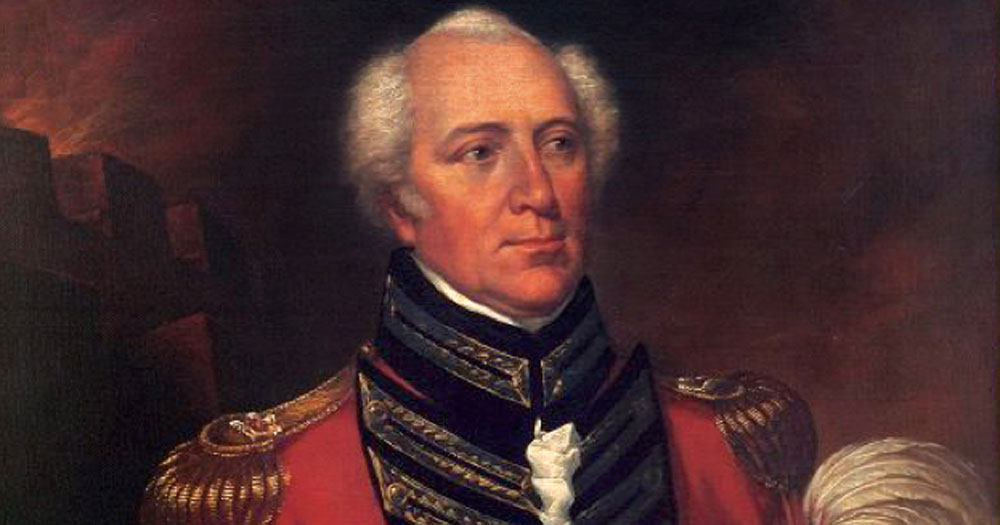Lieutenant-Colonel William Farquhar was the first British Resident to govern Singapore.
He was appointed by Stamford Raffles to oversee Singapore’s early growth as a modern trading port from 1819 to 1823.
Farquhar made many contributions to the island during his time as Resident.
Unfortunately, Raffles did not agree with Farquhar’s approach to governing Singapore.
Both men fell out and Farquhar was subsequently sacked by his boss.
#StoryOfModernLife
How to recognise Farquhar?
But Farquhar’s contributions to modern Singapore ought to be recognised.
As recognition, at least one writer to The Straits Times forum back in 2017 mooted the idea of naming a new road in Singapore after Farquhar, who surprisingly was a hit with his colonial subjects.
The letter (below at the end of page) published on June 2, 2017, spelt out Farquhar's affinity with the locals, who stymied the departure of their British administrator -- as he took two hours to bid them farewell because everyone wanted to meet him -- leaving him teary-eyed.
Sending a message
The suggestion to name a road after Farquhar might, after all, be a simplistic way to remember him and his contributions by.
But the act of christening a road after a person has powerful implications.
For one, it serves to elevate the "Farquhar" brand name here -- which is non-existent.
Another side effect, if it may even be called that, is that it serves to steer our fixation away from all things Raffles -- putting a dent in that premium brand name, if you will.
And giving some credit to Farquhar, where credit is due.
Or long overdue.
Not fully appreciated
But it might be a move that won't go down well with all Singaporeans -- because we really should be moving beyond our colonial past, having surpassed our colonial overlords given how they are mired in Brexit now.
Moreover, past incidents have shown that Singaporeans are becoming more sensitive towards the island’s colonial history and the lens in which this past is viewed.
Controversy with names
In September 2016, controversy erupted over the event name, The Empire Ball 2016, which was the National Gallery Singapore’s choice of name for its first fundraising gala.
Event organisers were accused of glorifying colonialism and the British Empire, and the event’s name was dropped.
Debate in press
A debate was also going on in ST’s forum pages in 2017 on Singapore’s colonial past.
Writers have argued how Singaporeans should address the British colonisation of Singapore.
The debate can be narrowed down into two camps.
1) Those who argue that colonialism brought some benefits to Singapore, and these should be appropriately acknowledged and remembered.
- Bicentennial of S'pore's founding offers teachable moment (May 22, 2017)
- Colonial era an important part of Singapore's story (June 1, 2017)
- Root of multiracial, multicultural S'pore linked to colonial past (May 30, 2017)
2) Those who feel that colonialism was bad, and any perceived benefits from it is overrated:
- Inappropriate to mark anniversary of colonisation (May 26, 2017)
- Seeds for multiculturalism planted long before Raffles arrived in Singapore (June 3, 2017)
- Acknowledging colonial legacy and celebrating it are two different things (June 1, 2017)
Against this backdrop of debate and discussion over how our colonial past and its legacies should be addressed, any call to name a road after Farquhar will not come to pass easily.
Bicentennial year debate
In 2019, Singaporeans are exploring the appropriate narrative of our common history, which shapes the Singaporean identity.
Farquhar, who happens to be related to Canadian Prime Minister Justin Trudeau, did make contributions to Singapore in his day.
But he was, ultimately, also a product of our colonialisation.
Perhaps the most appropriate way to remember Farquhar by is simply to be aware of Singapore's history -- warts and all.
Lest he becomes just another name, but nobody remembers who he was.
Or worse: Why are we even having this discussion in the first place?
While Sir Stamford Raffles was the founder of Singapore, Lieutenant-Colonel William Farquhar was the First Resident Minister from 1819 to 1823. It was he who governed the new settlement in the absence of Raffles, who was stationed in Bencoolen.
Among other challenges, Farquhar had to work within a limited budget. To fund the administration, he raked in revenue through the sale of licences for vices such as gambling dens and gaming houses, and through the sale of opium and alcohol.
Raffles was furious when he returned to Singapore and saw what was happening, as he regarded these activities as immoral.
Despite the prosperity achieved through Farquhar's diligent planning and governance, he was sacked.
John Turnbull's book, "Translations from the Hakayit Abdulla, Bin Abdulkadar, Munshi (1874)", records the day of his departure:
"It is not because he is a great man or a little man, rich or poor, but because of his amiability - on that account only; from this comes the excessive love of the people for him.
"Thousands of people followed him from his house to the seashore, each and every one bidding him goodbye, and offering their respects; and in receiving each, he was detained two hours before he could get into the vessel, his tears flowing.
"The people in the prows now fired cannons, guns, and crackers, some sang, some fiddled, each to their notion... making the whole sea resound... The appearance of the scene was as a father amongst his children, till all were weeping; he wept also."
We saw a similar moving farewell for our late prime minister Lee Kuan Yew.
Other colonial residents are remembered by landmarks, such as Crawford Street, Crawford Lane, Crawford Bridge after John Crawfurd; Church Street after Thomas Church; Raffles Institution after Sir Stamford Raffles.
Singapore used to have a Farquhar Street. It was located between Beach Road and North Bridge Road. However, it was expunged in 1994 due to street realignment and site development.
Shouldn't we consider naming another road to honour this man who laid the foundation of modern Singapore?
Tay Zi Han
Top image from Wikipedia.
 #SG200 is not a celebration. It's a commemoration. What's the difference? Click the logo. Maybe these articles might help.
#SG200 is not a celebration. It's a commemoration. What's the difference? Click the logo. Maybe these articles might help.
If you like what you read, follow us on Facebook, Instagram, Twitter and Telegram to get the latest updates.
